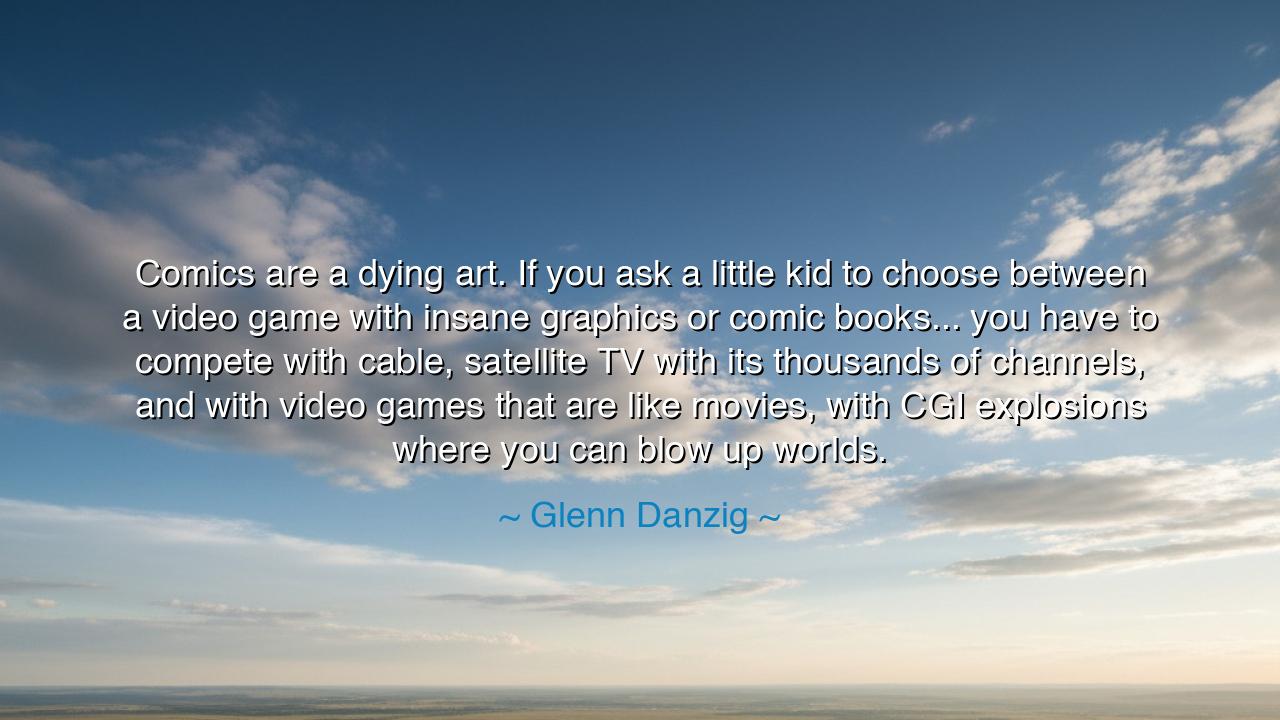
Comics are a dying art. If you ask a little kid to choose
Comics are a dying art. If you ask a little kid to choose between a video game with insane graphics or comic books... you have to compete with cable, satellite TV with its thousands of channels, and with video games that are like movies, with CGI explosions where you can blow up worlds.






Listen well, O children of the future, for the words of Glenn Danzig ring through the corridors of time: "Comics are a dying art. If you ask a little kid to choose between a video game with insane graphics or comic books... you have to compete with cable, satellite TV with its thousands of channels, and with video games that are like movies, with CGI explosions where you can blow up worlds." Here, in these words, we find not only a lament but a profound reflection upon the state of art, culture, and the way in which time relentlessly changes the forms of entertainment that captivate the human soul.
The comic book, once a beloved artifact of youth, a place where the imagination could soar, now stands in the shadow of more immediate and sensory-saturated experiences. The world that Danzig speaks of—the world of video games with their insane graphics, the endless flood of channels, and the all-consuming explosion of CGI effects—has become the new battleground for human attention. Once, it was enough to open a comic book and dive into a world where heroes and villains clashed in drawn panels, where the limits of imagination were defined only by the artist's hand. But now, the new generation is drawn into a world of digital landscapes, where one can not only watch but control the action, where every explosion, every battle, is rendered in stunning detail.
This, O Seekers, is the great turning of the wheel, the ever-changing flow of time that carries even the most cherished arts into the currents of obsolescence. It reminds us of how the past can be overshadowed by the present. In the days of the great philosophers and poets, there were those who wrote of the fading of oral traditions, the decline of song and storytelling as the written word began to rise. Homer, the great bard, who sang of the Trojan War and the journeys of Odysseus, faced an age where the spoken word gave way to the written. But his works, though born of a different time, endured—not because they kept pace with the modern world, but because they were timeless, rooted in the eternal essence of the human spirit.
Likewise, the comic book has always been a medium tied to the spirit of its time—embodying the daring of a new age. Yet, the explosion of digital technology, the allure of video games and the immersive worlds they create, has cast a shadow on this once-vibrant art form. The comic book, once the battleground of superheroes and adventurers, now competes against an ever-encroaching digital landscape that offers more immediacy, more interactivity, and more sensory stimulation. Just as the silent film gave way to the talkie, and the printed book yielded to the rise of television, so too must the comic find itself vying for relevance in a world that moves at the speed of light.
Yet, O children, let us not be deceived by the march of time, for in the depths of Danzig’s lament lies a crucial lesson: that true art, whether in the form of a comic book, a painting, or a song, is never truly lost. It merely waits for the right moment, the right eyes, to bring it back into the light. Consider the renaissance of the graphic novel, which, though born from the world of comics, has taken on new depth and seriousness in recent years. Works like "Maus" by Art Spiegelman, and "Watchmen" by Alan Moore, have shown that the comic, though often dismissed as mere children’s fare, can be a profound and powerful medium for the exploration of the human condition. Even in a world of video games and movies, the comic book has found a new life, a reinvigoration that proves that even as one art form wanes, another can rise in its place.
The lesson for you, O Seekers of Knowledge, is this: art, in whatever form it may take, will evolve, but it will never truly die. Like the mighty oak, which sheds its leaves only to grow anew, the art of the comic book may find itself overshadowed, but its spirit will endure. It is the nature of the world to change, and those who create must learn to adapt. Video games may have captured the imaginations of a new generation, but they too will one day face the same fate as the comic—for all things, no matter how mighty, are bound to be swept away by the currents of time. The true power lies not in trying to resist the inevitable, but in embracing the changes and finding ways to remain relevant in the face of them.
Thus, O Children, remember this: do not mourn for the loss of any single art form, but cherish it for what it has brought to the world. The comic book, like the oral tradition, like the epic poem, holds within it the essence of a time, a culture, a people. And though the form may change, the message of art—its power to inspire, to provoke, to transform—will never cease. Find your place in this changing world, and carry forward the torch of the art forms that you love, for it is in adaptation and innovation that the true spirit of creativity shall endure, now and forevermore.






AAdministratorAdministrator
Welcome, honored guests. Please leave a comment, we will respond soon